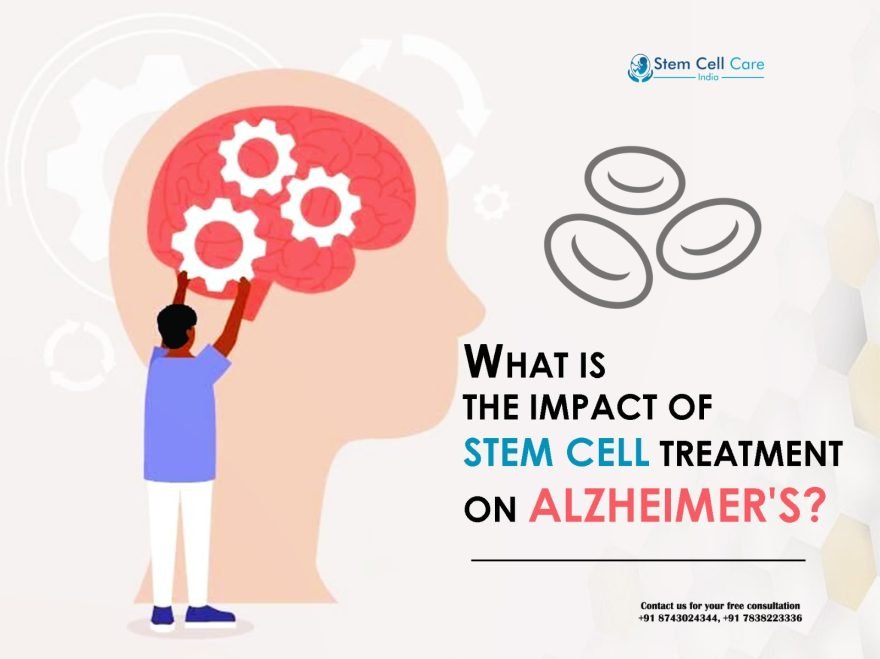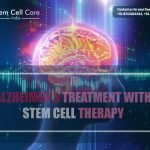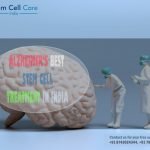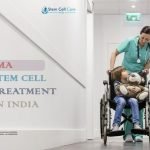Table of Contents
Alzheimer’s is referred to as a neuro disorder which occurs in the brain and causes memory loss, speech problems, and ability to daily activity. This condition can be worsened over time that’s why stem cell therapy for Alzheimer’s in India is becoming the new hope for many individuals. Even though it’s early, preliminary research indicates promising results. To find out how effectively it functions over the long term and how to improve it, more research is necessary.
What is Stem Cell Therapy and Its Types?
Using the special abilities of stem cells, stem cell therapy is a ground-breaking method in medicine that can replace, regenerate, or repair damaged organs and tissues. Undifferentiated cells with the ability to self-renew and differentiate into distinct cell types are known as stem cells.
There are several types of stem cells, each with its own characteristics and potential applications:
- Embryonic stem cells (ESCs): Derived from embryos at the blastocyst stage, these cells have the highest potential for differentiation into any cell type in the body. However, their use is ethically controversial due to the destruction of embryos.
- Adult stem cells: Found in various tissues throughout the body, these cells play crucial roles in tissue maintenance and repair. Although they have more limited differentiation potential compared to ESCs, they are ethically uncontroversial and can be isolated from adult tissues such as bone marrow, adipose tissue, and blood.
- Induced pluripotent stem cells (iPSCs): These are adult cells that have undergone genetic modification to be reprogrammed to a pluripotent state akin to ESCs. Without the ethical issues surrounding ESCs, iPSCs provide the possibility of disease modelling and customised therapeutics.
The advantages and disadvantages associated with each type of stem cell are distinct, influencing the field of stem cell therapy in Delhi NCR and its prospective uses in regenerative medicine and disease treatment.
What Are the Symptoms of Alzheimer’s Disease?
Alzheimer’s disease is a brain sickness that gets worse over time. It mainly affects memory and thinking. It makes it hard to do everyday things. It’s the most common form of dementia. This sickness slowly makes it difficult to live life well. Knowing the signs of Alzheimer’s is important to find it early and help manage it. Here are some key manifestations:
- Memory Loss: One of the hallmark symptoms of Alzheimer’s is significant memory loss, particularly in recent events or conversations. Individuals may forget important dates, appointments, or repeat the same questions or stories.
- Difficulty in Problem-Solving and Planning: Alzheimer’s makes it hard for the brain to do difficult things like solving problems, doing many things at once, and making plans. This can make it tough to handle money, cook using recipes, or keep track of a schedule.
- Confusion and Disorientation: Individuals with Alzheimer’s may experience confusion about time, place, or familiar faces. They may get lost in familiar surroundings or forget how they arrived at a certain location.
- Language and Communication Problems: Alzheimer’s can impair language skills, leading to difficulties in finding the right words, following conversations, or understanding written information. Speech may become repetitive or disjointed.
- Decline in Judgment and Decision-Making: Individuals with Alzheimer’s may exhibit poor judgement or decision-making abilities, such as giving away large sums of money to strangers or neglecting personal hygiene and safety.
- Changes in Mood and Personality: Alzheimer’s can lead to alterations in mood and behaviour, including increased irritability, agitation, or apathy. Individuals may also experience mood swings, depression, or anxiety without apparent reason.
People with Alzheimer’s disease and those who care for them can live better lives if we identify it early and take action. Stem cell treatment for Alzheimer’s in India can reduce the symptoms and inflammation faster than traditional treatment.
Impact of Stem Cell Therapy on Alzheimer’s
Stem cell therapy could change how we treat Alzheimer’s disease. It uses different methods to fight the disease, which has many parts that are hard to understand. Here are six key impacts of stem cell therapy on Alzheimer’s:
- Neuroregeneration:
Stem cells possess the remarkable ability to differentiate into various cell types, including neurons. Researchers want to put these cells into the brain to fix or replace the broken or missing brain cells that happen in Alzheimer’s. This ability to help nerves grow again is important for making the brain work better and making diseases go slower.
- Anti-inflammatory effects:
Alzheimer’s is associated with chronic neuroinflammation, exacerbating neuronal damage. Stem cells are really good at reducing swelling and helping the immune system in the brain. Stem cell therapy helps calm down swelling in the body, which doesn’t just protect the brain cells we already have but also makes it easier for new ones to grow.
- Neurotrophic support:
Stem cells secrete a myriad of neurotrophic factors that promote neuronal survival, growth, and connectivity. These special substances help create a protective environment for the brain, making it stronger against harmful things that can damage it in Alzheimer’s disease. They also help change and improve connections between brain cells, which is important for making your brain work better.
- Beta-amyloid clearance:
Beta-amyloid accumulation is a hallmark feature of Alzheimer’s, contributing to neuronal dysfunction and death. New studies show that some special cells can eat up and break down clumps of beta-amyloid in the brain. This could stop the disease from getting worse and help with memory problems.
- Functional recovery:
Beyond mere histological changes, stem cell therapy holds the potential to translate into meaningful functional improvements in Alzheimer’s patients. Research studies have shown that stem cell treatments can make people’s thinking better, help them do everyday things more easily, and make their lives happier. This shows how much stem cells can help patients.
Epilogue
Stem cell Therapy Delhi is a promising treatment option which helps to reduce the symptoms and inflammation. It has the regenerative potential to replace and fix the damaged tissues. It focuses on restoring neural connections, and preventing cognitive decline.
Stem Cell Care India is the best clinic which provides stem cell therapy for those who are suffering from this condition. Our team of doctors will assist you at any time, so you don’t have any issue with the treatment.







